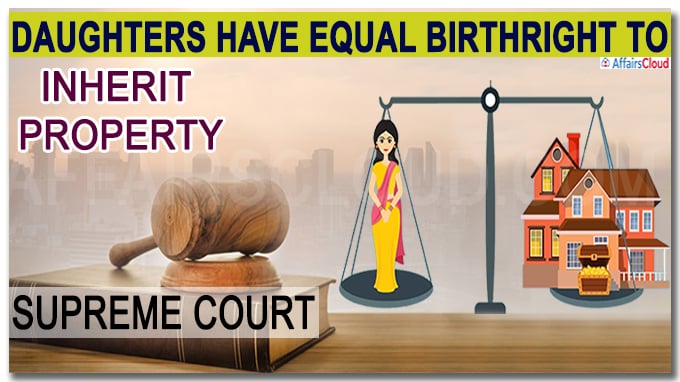 In accordance with the landmark judgment passed by three-judge Bench of Supreme Court (SC) headed by Justice Arun Mishra and comprised of Justices S Abdul Nazeer and Mukeshkumar Rasikbhai Shah, as per the Hindu Succession (Amendment) Act, 2005, the daughters will have equal inheritance rights as of sons in the properties of fathers, grandfathers and great-grandfathers right from the codification of the law in 1956 i.e. it would have retrospective effect.
In accordance with the landmark judgment passed by three-judge Bench of Supreme Court (SC) headed by Justice Arun Mishra and comprised of Justices S Abdul Nazeer and Mukeshkumar Rasikbhai Shah, as per the Hindu Succession (Amendment) Act, 2005, the daughters will have equal inheritance rights as of sons in the properties of fathers, grandfathers and great-grandfathers right from the codification of the law in 1956 i.e. it would have retrospective effect.
- A retrospective law is one that is to take effect, in point of time, before it was passed.
Reason behind this Ruling: Important
The amendment to the Section 6 of Hindu Succession Act, 1956, which came into force from September 9, 2005 as Hindu Succession (Amendment) Act, 2005, conferred the status of “coparcener” to a daughter born before or after the amendment in the same manner as a son. After this, an issue was raised regarding the retrospective effect of the amendment, means, whether this amendment is effective if the parent/father died before it has come into force.
- Now, the 121 page verdict has made it clear that whether the father was alive or not before September 9, 2005 daughters could claim equal right in inheritance. But, while claiming coparcenary rights, daughters, will not be able to question disposal or alienation of ancestral properties by the existing coparceners prior to December 20, 2004, as provided in the amended Section 6(1).
- Coparcener is a person who has a birthright to parental property.
- Coparcenary property is the one which is inherited by a Hindu from his father, grandfather, or great grandfather.
- Section 6 recognises a joint Hindu family governed by Mitakshara law.
Recent Related News:
On 22th May 2020, Former Supreme Court Justice A K Sikri, International Judge, Singapore International Commercial Court inaugurates Indian Dispute Resolution Centre(IDRC), first of its kind Institutional Alternative Dispute Resolution(ADR) Centre to provide Offline and e-ADR facility through e-Arbitration, e-Mediation and e-Conciliation software portal.
About Supreme Court:
Chief Justice of India (CJI)– Sharad Arvind Bobde
Location– New Delhi




